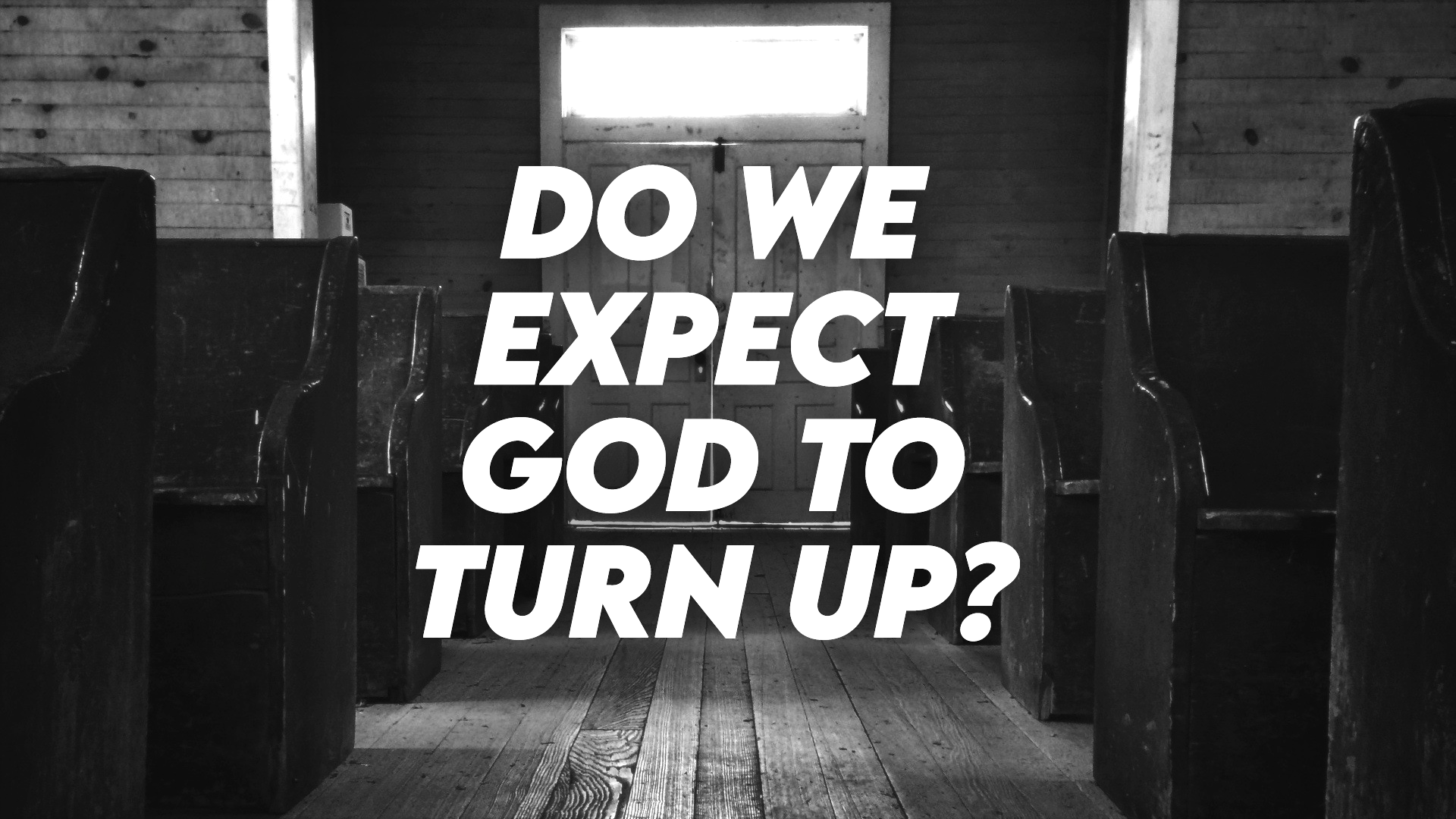Do we expect God to turn up? (Part 2)

I wonder if we church leaders really expect God to turn up at our place of worship on a Sunday? If we did, do you not think we might do things in a different way?
Moses was called to lead a people who had lost their way, lost their identity and above all lost their belief that God had a purpose and a plan for their personal and corporate lives. Moses faced a people who were enslaved by the activities and actions of the past. Moses himself had lost all hope until God turned up one day in the most unexpected of places. A burning bush (which incidentally is the emblem and branding we use in the Church of Scotland to distinguish ourselves).
God tells Moses that his presence is going to overshadow him and that the people of God will know and recognise his God given authority and grace because it will be obvious to all that he has encountered the presence of the Almighty.
When we lead worship should we not also draw upon our personal God encounters, believing that our time with God in the secret and sacred spaces of our own lives places and enables us to believe that others can also know the intimate touch of the Almighty?
Perhaps those of us tasked with ordering the format of worship need to leave space for the spontaneity of the Spirit to be at work amidst the community of worshippers we are leading. And those who are being led need also to come expecting to encounter the living God.
Leaders need to lead with greater anticipation, expectantly waiting for the Spirit of God to surround and embrace the gathered community, drawing them into the presence of the Father through the grace of the Son. Believing the presence of God to be in our service changes everything. It means we come more prepared to allow room for the mystery and grace of God to be revealed in worship. We spend more time preparing the people to be expectant, to be ready to worship.
At present the mainline institutional churches in Western Europe are facing a crisis. Sunday morning worship is no longer the pull that it used to be. Something has changed. Could it be that more expectation is required? It’s not the songs we sing or the length of time we spend in the service that determines the presence of God. It’s all to do with our hearts and they need to find once more a turning point to encounter the glory.
A few years ago Bishop David Pytches told this story at a conference I attended and I have never forgotten its impact.
It was late Friday afternoon and a young woman who was a personal assistant to a senior executive, was engaging a client in conversation until her boss was free to be part of the meeting. The client had flown in from Holland for a working weekend. During the conversation the business executive, out of polite interest, asked the young woman if she had s busy weekend ahead.
The reply went something like this, “Oh I can’t wait to get to church on Sunday, you see God always turns up.”
The man was a bit taken aback; then much to the young woman’s surprise he proceeded to ask directions to the church, adding “I wouldn’t mind attending a church where God turned up.” The following Sunday and for many months later the man flew from the Netherlands each Sunday because he too had encountered God in the fellowship of this worshipping community. Eventually the bishop drew the man to one side and reminded him that God turned up in other churches as well.
There were people in the building looking with expectation to meet God. For me too often we in the mainline churches have restricted God through our formats and rituals. Too often we have been worshipping God in another generation’s clothes and culture.
 The challenge for church leaders today is to begin to experiment with the content of worship. And the challenge for congregations today is to give those who are ordering the worship permission to try new things.
The challenge for church leaders today is to begin to experiment with the content of worship. And the challenge for congregations today is to give those who are ordering the worship permission to try new things.
We also need to give ourselves permission to become participants in the renewal of the church. Each of us needs to change our worship behaviours. Perhaps by sitting in another seat, or attending another congregation, or inviting someone from church home for lunch, or perhaps starting a small Sanctuary First study group in a suitable home. One thing we could all do to benefit worship would be by coming closer together, rather than sitting spread out over across a huge building that is no longer fit for purpose.
When is the penny going to drop that the renewal of the church starts with this generation? By this I mean all of us who turn up at church Sunday after Sunday expecting nothing much to happen, yet longing for something to change, we are the only people to bring the change into being.
One thing I have been talking a lot about is the need for every parish in Scotland to have its emergency plan. When the church with only 50 regular worshippers drops in 5 years to 20 what is your exit plan? How are you going to transition to a new place, to a new format of being church? Each congregation needs to have this conversation. We need to be making our plans as to who is going to inherit the ministries of our parishes. Are we willing to simply let local church die or are we willing to allow it to be transformed?
The transformation begins when we become people who expect God to turn up to Sunday worship because we have met with him during the week. Sanctuary First is seeking to find new ways of offering those points of connection throughout our daily lives.
Very Rev Albert Bogle
To read Part 1 of Albert’s blog series about leadership in the church head here.




 Add to Favourites
Add to Favourites







Login to comment.